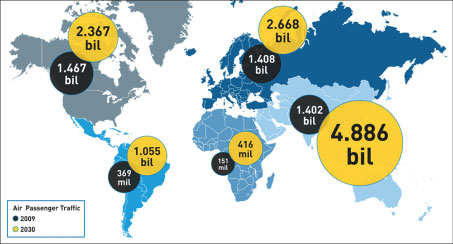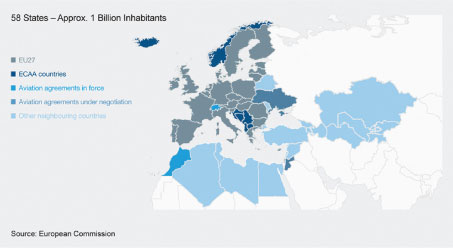
Global shift in aviation per continent.
In his speech at the ACI EUROPE Annual Congress, Ad Rutten, outgoing ACI EUROPE President and COO, Schiphol Group, explained that “the maturity of the European market and the boom of aviation in emerging countries mean that our most promising opportunities are now outside Europe”. “We must be in a condition to attract and develop air traffic flows to and from our external markets,” he added.
Europe’s airports lost 100 million passengers in the wake of the global financial crisis and traffic recovery has been comparatively slow. That contrasts with Africa, Asia and Latin America, which have experienced a dynamic recovery since 2009. European aviation is also facing competitive pressures from emerging countries, in which aviation growth is a priority for national economic policy.
Echoing the newly released ACI EUROPE publication’s call for an acceleration of aviation liberalisation, Rutten declared “European aviation is at a crossroads. There is no more time to lose. We must move forward with liberalisation with the new economic powerhouses in Asia and Latin America. The future relevance of the European aviation market hangs in the balance.”
Single European aviation market – ‘a unique asset’
The Single European aviation market was established in the 1990s, removing all restrictions on air services within the EU. This created the world’s largest liberalised aviation market and the impact has been phenomenal, for all stakeholders and the European economy. The emergence of the low-cost carriers, for example, has resulted in significant network development.
The ACI EUROPE publication emphasises that the Single European aviation market is “a unique asset which has fully served its purpose, allowing aviation to provide optimum connectivity for Europe, with a contribution of more than €120 billion to its economy and 3 million jobs.”
The ACI EUROPE publication contains three guiding principles. Firstly, take a leadership position, recognising the key role of aviation liberalisation to enhance the competitiveness of the European air transport industry. This is important to protect and reinforce the position of Europe’s airport hubs and network airlines, and to create new business opportunities for Europe’s regional airports, as well as Europe’s network and low-cost airlines. Aviation liberalisation is about creating a competitive marketplace for the benefit of the travelling public and the European economy. The EU needs to take the lead to protect its position as a dynamic and attractive aviation market, and also to position itself to compete with new and emerging aviation powers.
Secondly, “first mover” advantage – moving now to liberalise aviation between the EU and its external markets – before liberalisation efforts between emerging markets step up – would enable Europe to further capitalise on what has already been achieved. This would protect and reinforce the position of the European aviation market on the global stage. Moving first on aviation liberalisation would also be important for the dissemination of European technical standards – potentially significantly beneficial for the European aerospace industry. It is about putting European aviation in a position to anticipate and adapt to the new reality of the global aviation market.
Thirdly, extending the European Common Aviation Area and reaching out to the EU’s main trading partners.
“The EU must seriously look at taking a leadership position globally on aviation liberalisation, and make the most of the “first mover” advantage. We need to step up efforts to extend our open aviation market to the East and across the Mediterranean. We also need liberalisation with our trading partners in all emerging markets – the BRICs (Brazil, Russia, India, China) of course, but also Mexico and the ASEAN (Association of South East Asian Nations) countries,” explained Rutten. “The European Commission is very supportive on this point, but it needs both a renewed political commitment and adequate resources for the task.”
ACI EUROPE calls for the EU to step up efforts to create a pan-European/Mediterranean aviation area, extending to North Africa, the Near East, Turkey and all countries to the East of the EU except Russia, but including Central Asia. The ACI EUROPE publication highlights the significant potential for air traffic development, given the existing economic, political and cultural ties between these countries and EU States. This potential is borne out by the example of the EU/Morocco aviation agreement signed in 2006 – total passenger traffic increased by +22% in 2007 to 8 million.

It is of particular relevance to regional airports. Tonci Peovic, General Manager, Zagreb Airport and Chair of ACI EUROPE’s Regional Airports’ Forum, said: “I strongly advocate aviation liberalisation. Regional airports have no slot constraints because they are under-utilised. These airports can be a future point of cooperation with the emerging economies.”
‘Expanding Europe’s Aviation Market…’ has already been distributed to ACI EUROPE members, the EU institutions and other key authorities and stakeholders. ACI EUROPE is also liaising with Members States to enlist support for its proposed strategy. The European Commission is reportedly very appreciative, especially as some other aviation stakeholders are not very supportive of further liberalisation, in particular airlines like Lufthansa and Air France-KLM.
However, in the globalised, multi-polar world of today, further liberalisation beyond the current boundaries of the Single European aviation market, should be a political priority. Indeed, under the current Polish Presidency of the EU, a special EU-Russia Aviation Summit is due to take place in St Petersburg on 12 & 13 October. European Commission Vice President in charge of Transport, Siim Kallas will speak at the event, as will ACI EUROPE Director General Olivier Jankovec.
‘Expanding Europe’s Aviation Market – Prerequisite for Global Relevance’ can be downloaded from the Policy Library, on ACI EUROPE’s website.







